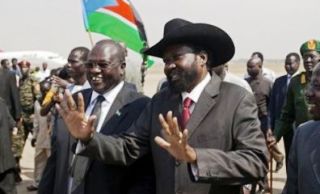South Sudan security officer threatens private TV station at gun point
May 30, 2013 (JUBA) – A South Sudanese security agent on Thursday raided, at gun point, offices of the The Citizen newspaper warning its television station against relaying news on the political engagements of the country’s vice president, Riek Machar.

Machar, one of the officials who saw off the president at Juba airport on Wednesday, is reportedly considering a bid to become the chairperson of the South Sudan’s ruling party (SPLM) at an upcoming conference.
Nhial Bol Aken, The Citizen‘s managing director, told Sudan Tribune that a member of the security services visited his office and “demanded [that] all programs should not be broadcast before they [security organs] know about our reports”.
The security agent said it was a directive from the “headquarters”, but did not specify of what institution, Akeen said Thursday He added that last week security officers warned his reporters “not to report on certain issues without consulting them or those relating to the activities relating to the vice president”.
“The security officer was furious and went to our station and threatened the manager at gun point. He told the manger point blank not to publish anything relating to the vice president,” said the veteran journalist.
With Kiir in Japan, Machar remains South Sudan’s acting president until the former returns, making it hard for the media not cover his activities.
“I do not understand how it will work as the vice president is currently the acting president and there is no way we can avoid covering activities relating to the national issues, since he is now the acting president”, Akeen said.
He further stressed that such a directive should have been officially made rather than through informal threats.
“It should be in a meeting or put it in writing so that it becomes official instead of coming with threats and attack. What they are doing is an attack on freedom and public right to access information”, he said.
The Citizen boss, however, said he suspects the security agents who came to their offices were acting on instructions from individuals within the security institutions, who plan to restrict the media from covering certain issues; especially those relating to the current power struggle within the SPLM leadership.
Meanwhile, the government has denied it plans to restrict media activities in the country. It also claimed it had no information on the incident at the The Citizen television, but vowed a follow-up of the matter and act on those involved.
“I am not aware of this information and we will find out who of the security personnel were involved”, a senior officer in the office of South Sudan’s national security minister said Thursday.
The officer, who did not want to be identified, said he was sure South Sudan’s security minister, Oyai Deng, was “not aware” of such a directive, but advised media outlets to excise responsibility while writing or broadcasting news.
Journalists in South Sudan often complain that the security services are forcing the young nation’s press to self censor their coverage of events relating to actions of the security services, human rights and corruption. The media is now also being barred from covering activities related to the vice-president’s activities, since the Kiir-Machar row erupted recently.
Last week the US envoy to Juba, Susan Page, said her government was “very concerned about the deteriorating levels of press freedom” in the South Sudan.
“The continued push back, intimidation and harassment of journalists is a violation of their rights and freedoms,” she said last Friday.
Page’s remarks came after the Committee to Protection of Journalists (CPJ) wrote an open letter to president Kiir asking him to address the deteriorating state of press freedom in two-year-old nation.
“We urge you to use the power of your office to ensure that journalists are allowed to work freely without harassment and censure from state security officials”, the letter says.
CPJ said it had documented at least 12 cases of “attacks, harassment, and detention” of journalists in South Sudan in past six months.
“In all but two of the cases, security officials were the perpetrators. Security agents, including police, have routinely harassed, intimidated, and occasionally detained journalists,” the letter said.
Threats against the press not only violate South Sudan’s constitution but also the values the ruling SPLM said it was fighting for during decades of civil war.
This year’s press freedom rankings published by Reporters Without Borders saw South Sudan drop 13 places from 111th to the 124th worst country on the list.
(ST)
